Commercial and Corporation Law: Insolvency and Contract Law Analysis
VerifiedAdded on 2021/06/14
|6
|1299
|147
Case Study
AI Summary
This case study delves into two key issues within commercial and corporation law. The first issue examines the authority and potential liabilities of company directors under the Corporations Act 2001, particularly concerning insolvent trading. It analyzes the responsibilities of directors to prevent insolvent trading, the consequences of breaching these duties, and the potential for civil and criminal penalties, considering scenarios where directors may or may not have acted dishonestly or with knowledge of the company's financial state. The second issue explores the legal standing of a company (CloudTech) in relation to contracts formed by a director (Alexandra) with another company (Banger Pyt Ltd.), focusing on the application of Section 183 of the Corporations Act, which governs the use of company information by directors. The case study considers whether actions can be taken by CloudTech against Alexandra for using company information to benefit a new company, and it evaluates the breach of directors' duties, even after resignation. The analysis includes relevant case law and statutory provisions to support its conclusions.
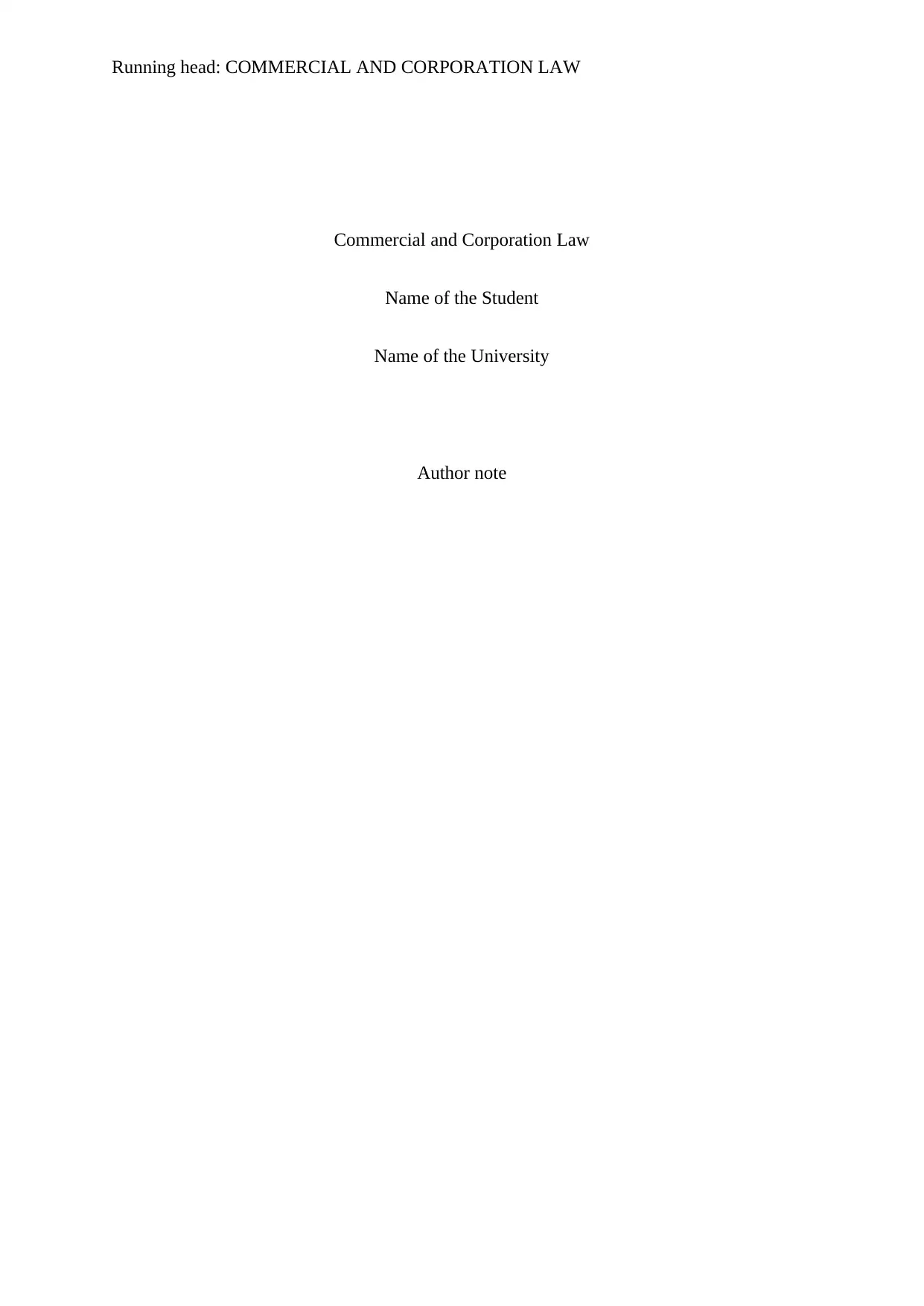
Running head: COMMERCIAL AND CORPORATION LAW
Commercial and Corporation Law
Name of the Student
Name of the University
Author note
Commercial and Corporation Law
Name of the Student
Name of the University
Author note
Paraphrase This Document
Need a fresh take? Get an instant paraphrase of this document with our AI Paraphraser
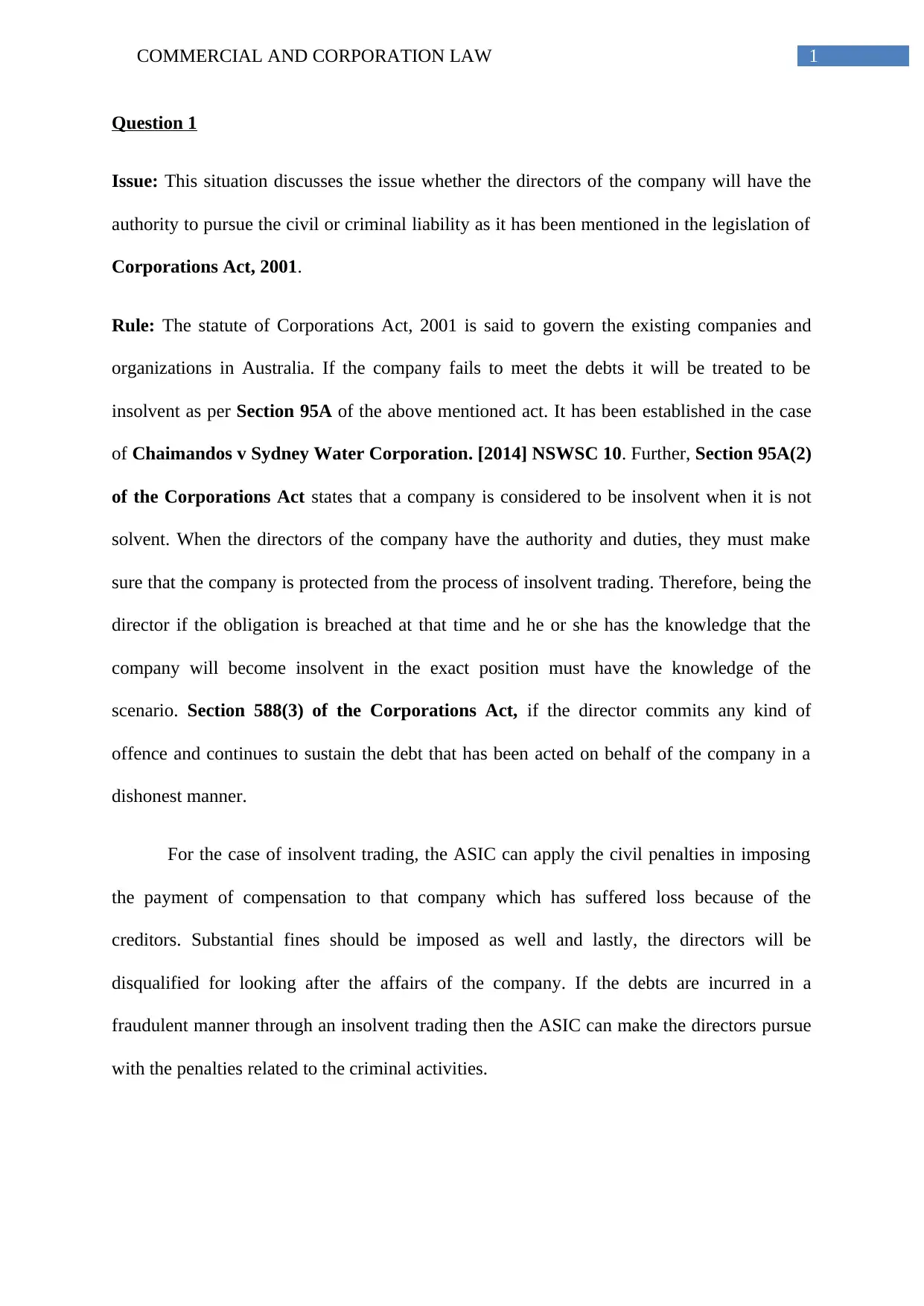
1COMMERCIAL AND CORPORATION LAW
Question 1
Issue: This situation discusses the issue whether the directors of the company will have the
authority to pursue the civil or criminal liability as it has been mentioned in the legislation of
Corporations Act, 2001.
Rule: The statute of Corporations Act, 2001 is said to govern the existing companies and
organizations in Australia. If the company fails to meet the debts it will be treated to be
insolvent as per Section 95A of the above mentioned act. It has been established in the case
of Chaimandos v Sydney Water Corporation. [2014] NSWSC 10. Further, Section 95A(2)
of the Corporations Act states that a company is considered to be insolvent when it is not
solvent. When the directors of the company have the authority and duties, they must make
sure that the company is protected from the process of insolvent trading. Therefore, being the
director if the obligation is breached at that time and he or she has the knowledge that the
company will become insolvent in the exact position must have the knowledge of the
scenario. Section 588(3) of the Corporations Act, if the director commits any kind of
offence and continues to sustain the debt that has been acted on behalf of the company in a
dishonest manner.
For the case of insolvent trading, the ASIC can apply the civil penalties in imposing
the payment of compensation to that company which has suffered loss because of the
creditors. Substantial fines should be imposed as well and lastly, the directors will be
disqualified for looking after the affairs of the company. If the debts are incurred in a
fraudulent manner through an insolvent trading then the ASIC can make the directors pursue
with the penalties related to the criminal activities.
Question 1
Issue: This situation discusses the issue whether the directors of the company will have the
authority to pursue the civil or criminal liability as it has been mentioned in the legislation of
Corporations Act, 2001.
Rule: The statute of Corporations Act, 2001 is said to govern the existing companies and
organizations in Australia. If the company fails to meet the debts it will be treated to be
insolvent as per Section 95A of the above mentioned act. It has been established in the case
of Chaimandos v Sydney Water Corporation. [2014] NSWSC 10. Further, Section 95A(2)
of the Corporations Act states that a company is considered to be insolvent when it is not
solvent. When the directors of the company have the authority and duties, they must make
sure that the company is protected from the process of insolvent trading. Therefore, being the
director if the obligation is breached at that time and he or she has the knowledge that the
company will become insolvent in the exact position must have the knowledge of the
scenario. Section 588(3) of the Corporations Act, if the director commits any kind of
offence and continues to sustain the debt that has been acted on behalf of the company in a
dishonest manner.
For the case of insolvent trading, the ASIC can apply the civil penalties in imposing
the payment of compensation to that company which has suffered loss because of the
creditors. Substantial fines should be imposed as well and lastly, the directors will be
disqualified for looking after the affairs of the company. If the debts are incurred in a
fraudulent manner through an insolvent trading then the ASIC can make the directors pursue
with the penalties related to the criminal activities.
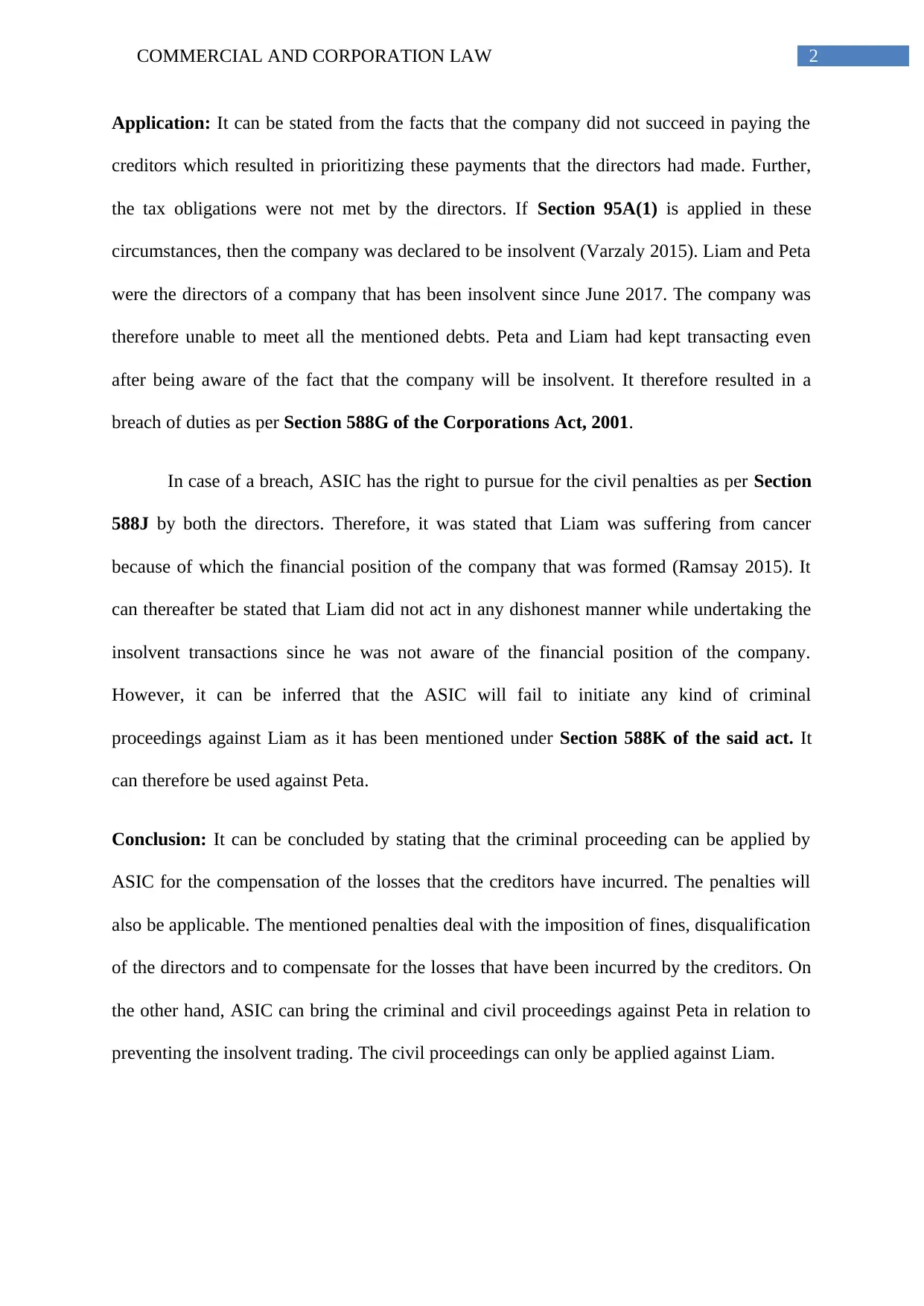
2COMMERCIAL AND CORPORATION LAW
Application: It can be stated from the facts that the company did not succeed in paying the
creditors which resulted in prioritizing these payments that the directors had made. Further,
the tax obligations were not met by the directors. If Section 95A(1) is applied in these
circumstances, then the company was declared to be insolvent (Varzaly 2015). Liam and Peta
were the directors of a company that has been insolvent since June 2017. The company was
therefore unable to meet all the mentioned debts. Peta and Liam had kept transacting even
after being aware of the fact that the company will be insolvent. It therefore resulted in a
breach of duties as per Section 588G of the Corporations Act, 2001.
In case of a breach, ASIC has the right to pursue for the civil penalties as per Section
588J by both the directors. Therefore, it was stated that Liam was suffering from cancer
because of which the financial position of the company that was formed (Ramsay 2015). It
can thereafter be stated that Liam did not act in any dishonest manner while undertaking the
insolvent transactions since he was not aware of the financial position of the company.
However, it can be inferred that the ASIC will fail to initiate any kind of criminal
proceedings against Liam as it has been mentioned under Section 588K of the said act. It
can therefore be used against Peta.
Conclusion: It can be concluded by stating that the criminal proceeding can be applied by
ASIC for the compensation of the losses that the creditors have incurred. The penalties will
also be applicable. The mentioned penalties deal with the imposition of fines, disqualification
of the directors and to compensate for the losses that have been incurred by the creditors. On
the other hand, ASIC can bring the criminal and civil proceedings against Peta in relation to
preventing the insolvent trading. The civil proceedings can only be applied against Liam.
Application: It can be stated from the facts that the company did not succeed in paying the
creditors which resulted in prioritizing these payments that the directors had made. Further,
the tax obligations were not met by the directors. If Section 95A(1) is applied in these
circumstances, then the company was declared to be insolvent (Varzaly 2015). Liam and Peta
were the directors of a company that has been insolvent since June 2017. The company was
therefore unable to meet all the mentioned debts. Peta and Liam had kept transacting even
after being aware of the fact that the company will be insolvent. It therefore resulted in a
breach of duties as per Section 588G of the Corporations Act, 2001.
In case of a breach, ASIC has the right to pursue for the civil penalties as per Section
588J by both the directors. Therefore, it was stated that Liam was suffering from cancer
because of which the financial position of the company that was formed (Ramsay 2015). It
can thereafter be stated that Liam did not act in any dishonest manner while undertaking the
insolvent transactions since he was not aware of the financial position of the company.
However, it can be inferred that the ASIC will fail to initiate any kind of criminal
proceedings against Liam as it has been mentioned under Section 588K of the said act. It
can therefore be used against Peta.
Conclusion: It can be concluded by stating that the criminal proceeding can be applied by
ASIC for the compensation of the losses that the creditors have incurred. The penalties will
also be applicable. The mentioned penalties deal with the imposition of fines, disqualification
of the directors and to compensate for the losses that have been incurred by the creditors. On
the other hand, ASIC can bring the criminal and civil proceedings against Peta in relation to
preventing the insolvent trading. The civil proceedings can only be applied against Liam.
⊘ This is a preview!⊘
Do you want full access?
Subscribe today to unlock all pages.

Trusted by 1+ million students worldwide
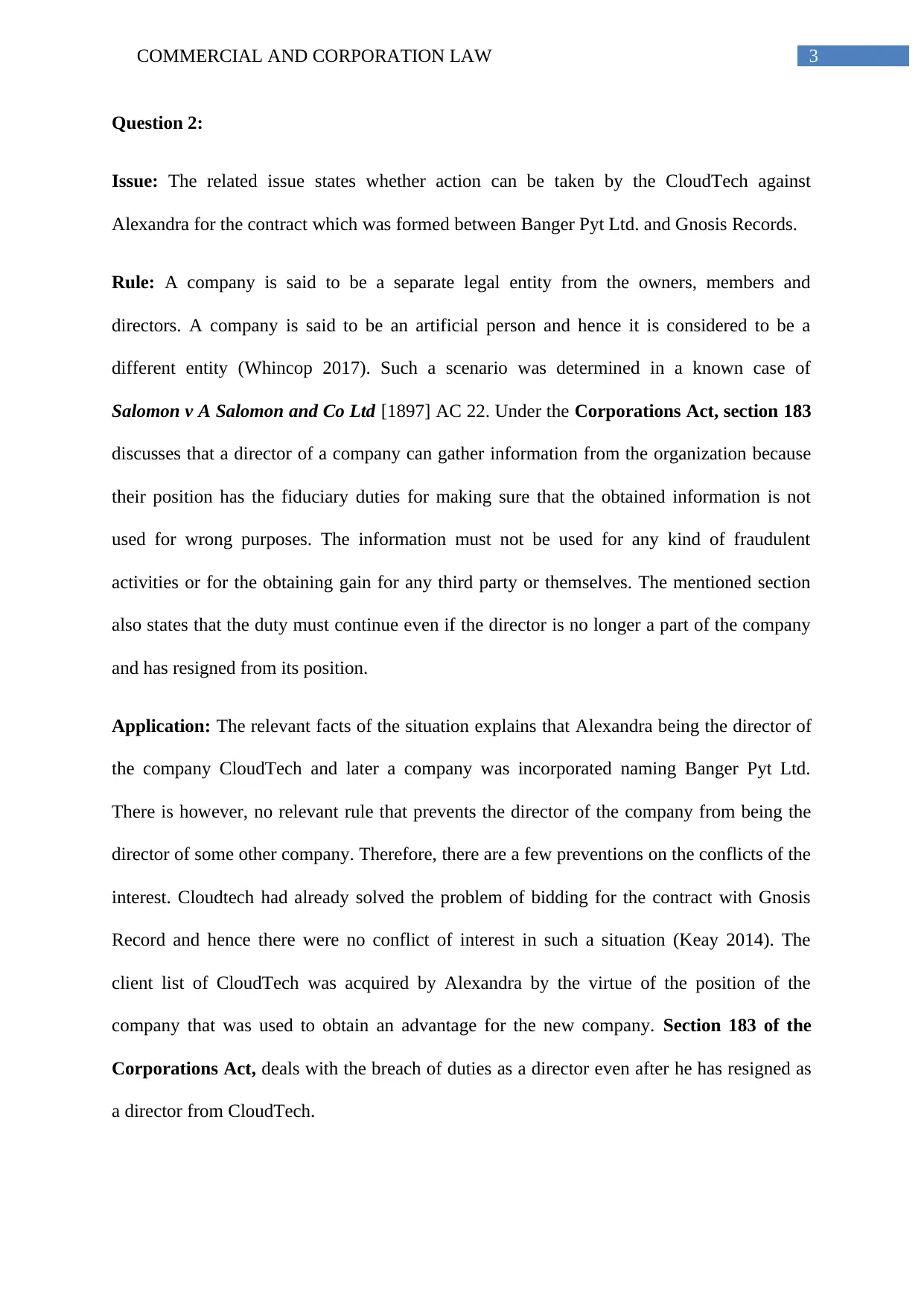
3COMMERCIAL AND CORPORATION LAW
Question 2:
Issue: The related issue states whether action can be taken by the CloudTech against
Alexandra for the contract which was formed between Banger Pyt Ltd. and Gnosis Records.
Rule: A company is said to be a separate legal entity from the owners, members and
directors. A company is said to be an artificial person and hence it is considered to be a
different entity (Whincop 2017). Such a scenario was determined in a known case of
Salomon v A Salomon and Co Ltd [1897] AC 22. Under the Corporations Act, section 183
discusses that a director of a company can gather information from the organization because
their position has the fiduciary duties for making sure that the obtained information is not
used for wrong purposes. The information must not be used for any kind of fraudulent
activities or for the obtaining gain for any third party or themselves. The mentioned section
also states that the duty must continue even if the director is no longer a part of the company
and has resigned from its position.
Application: The relevant facts of the situation explains that Alexandra being the director of
the company CloudTech and later a company was incorporated naming Banger Pyt Ltd.
There is however, no relevant rule that prevents the director of the company from being the
director of some other company. Therefore, there are a few preventions on the conflicts of the
interest. Cloudtech had already solved the problem of bidding for the contract with Gnosis
Record and hence there were no conflict of interest in such a situation (Keay 2014). The
client list of CloudTech was acquired by Alexandra by the virtue of the position of the
company that was used to obtain an advantage for the new company. Section 183 of the
Corporations Act, deals with the breach of duties as a director even after he has resigned as
a director from CloudTech.
Question 2:
Issue: The related issue states whether action can be taken by the CloudTech against
Alexandra for the contract which was formed between Banger Pyt Ltd. and Gnosis Records.
Rule: A company is said to be a separate legal entity from the owners, members and
directors. A company is said to be an artificial person and hence it is considered to be a
different entity (Whincop 2017). Such a scenario was determined in a known case of
Salomon v A Salomon and Co Ltd [1897] AC 22. Under the Corporations Act, section 183
discusses that a director of a company can gather information from the organization because
their position has the fiduciary duties for making sure that the obtained information is not
used for wrong purposes. The information must not be used for any kind of fraudulent
activities or for the obtaining gain for any third party or themselves. The mentioned section
also states that the duty must continue even if the director is no longer a part of the company
and has resigned from its position.
Application: The relevant facts of the situation explains that Alexandra being the director of
the company CloudTech and later a company was incorporated naming Banger Pyt Ltd.
There is however, no relevant rule that prevents the director of the company from being the
director of some other company. Therefore, there are a few preventions on the conflicts of the
interest. Cloudtech had already solved the problem of bidding for the contract with Gnosis
Record and hence there were no conflict of interest in such a situation (Keay 2014). The
client list of CloudTech was acquired by Alexandra by the virtue of the position of the
company that was used to obtain an advantage for the new company. Section 183 of the
Corporations Act, deals with the breach of duties as a director even after he has resigned as
a director from CloudTech.
Paraphrase This Document
Need a fresh take? Get an instant paraphrase of this document with our AI Paraphraser
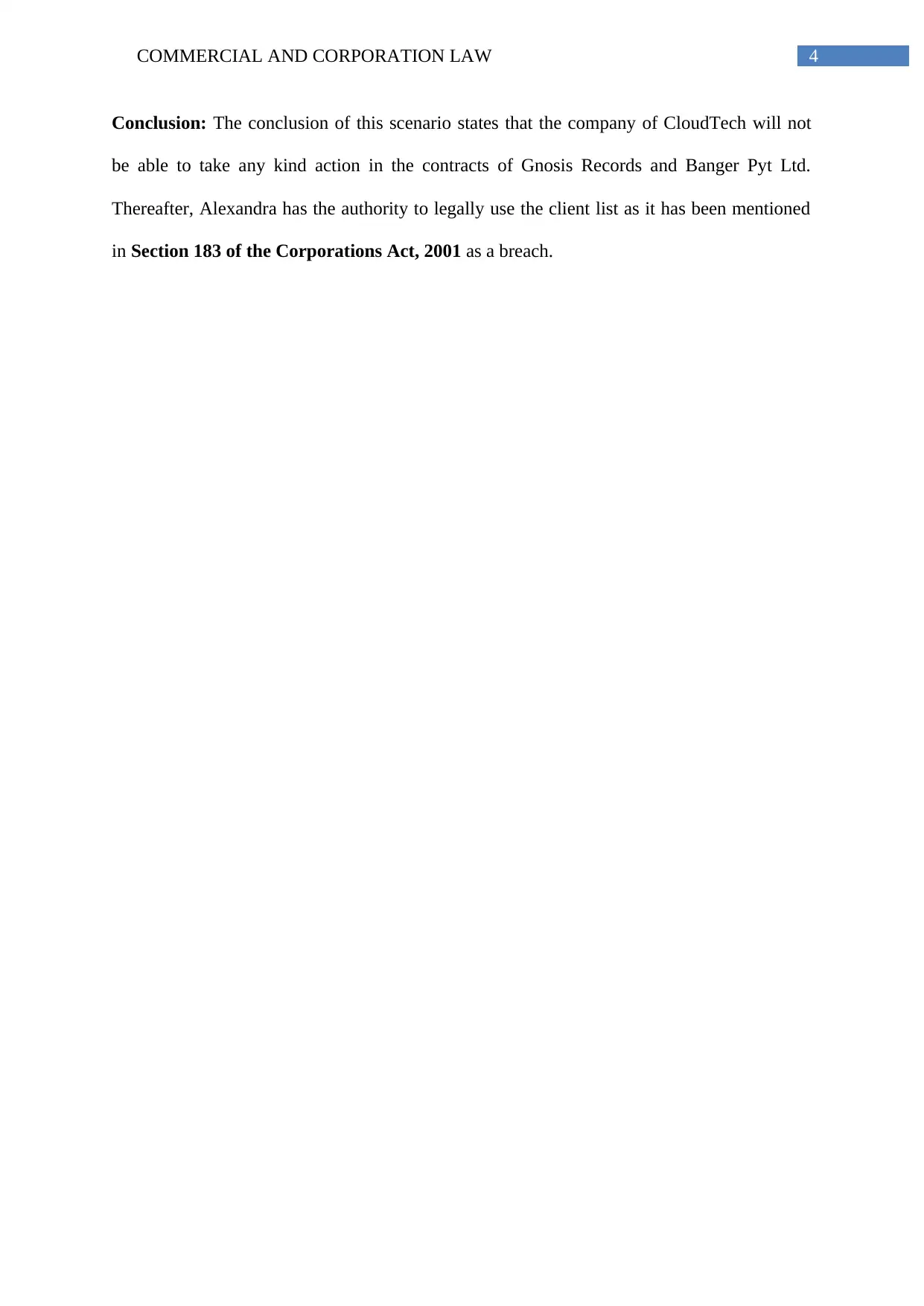
4COMMERCIAL AND CORPORATION LAW
Conclusion: The conclusion of this scenario states that the company of CloudTech will not
be able to take any kind action in the contracts of Gnosis Records and Banger Pyt Ltd.
Thereafter, Alexandra has the authority to legally use the client list as it has been mentioned
in Section 183 of the Corporations Act, 2001 as a breach.
Conclusion: The conclusion of this scenario states that the company of CloudTech will not
be able to take any kind action in the contracts of Gnosis Records and Banger Pyt Ltd.
Thereafter, Alexandra has the authority to legally use the client list as it has been mentioned
in Section 183 of the Corporations Act, 2001 as a breach.
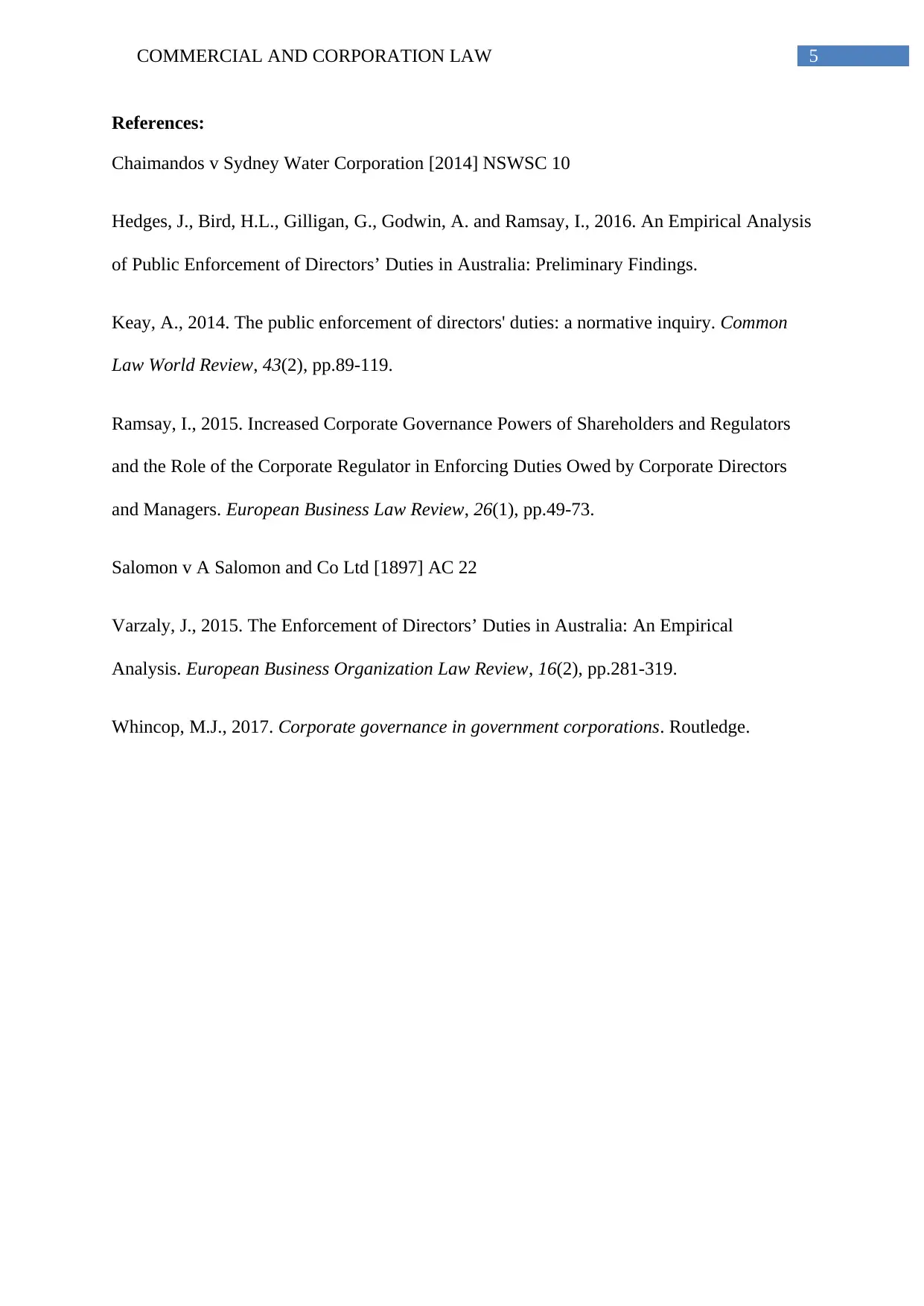
5COMMERCIAL AND CORPORATION LAW
References:
Chaimandos v Sydney Water Corporation [2014] NSWSC 10
Hedges, J., Bird, H.L., Gilligan, G., Godwin, A. and Ramsay, I., 2016. An Empirical Analysis
of Public Enforcement of Directors’ Duties in Australia: Preliminary Findings.
Keay, A., 2014. The public enforcement of directors' duties: a normative inquiry. Common
Law World Review, 43(2), pp.89-119.
Ramsay, I., 2015. Increased Corporate Governance Powers of Shareholders and Regulators
and the Role of the Corporate Regulator in Enforcing Duties Owed by Corporate Directors
and Managers. European Business Law Review, 26(1), pp.49-73.
Salomon v A Salomon and Co Ltd [1897] AC 22
Varzaly, J., 2015. The Enforcement of Directors’ Duties in Australia: An Empirical
Analysis. European Business Organization Law Review, 16(2), pp.281-319.
Whincop, M.J., 2017. Corporate governance in government corporations. Routledge.
References:
Chaimandos v Sydney Water Corporation [2014] NSWSC 10
Hedges, J., Bird, H.L., Gilligan, G., Godwin, A. and Ramsay, I., 2016. An Empirical Analysis
of Public Enforcement of Directors’ Duties in Australia: Preliminary Findings.
Keay, A., 2014. The public enforcement of directors' duties: a normative inquiry. Common
Law World Review, 43(2), pp.89-119.
Ramsay, I., 2015. Increased Corporate Governance Powers of Shareholders and Regulators
and the Role of the Corporate Regulator in Enforcing Duties Owed by Corporate Directors
and Managers. European Business Law Review, 26(1), pp.49-73.
Salomon v A Salomon and Co Ltd [1897] AC 22
Varzaly, J., 2015. The Enforcement of Directors’ Duties in Australia: An Empirical
Analysis. European Business Organization Law Review, 16(2), pp.281-319.
Whincop, M.J., 2017. Corporate governance in government corporations. Routledge.
⊘ This is a preview!⊘
Do you want full access?
Subscribe today to unlock all pages.

Trusted by 1+ million students worldwide
1 out of 6
Related Documents
Your All-in-One AI-Powered Toolkit for Academic Success.
+13062052269
info@desklib.com
Available 24*7 on WhatsApp / Email
![[object Object]](/_next/static/media/star-bottom.7253800d.svg)
Unlock your academic potential
Copyright © 2020–2026 A2Z Services. All Rights Reserved. Developed and managed by ZUCOL.





